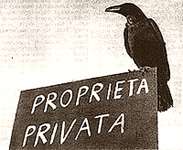Secret Distribution of Natural Resources
The RF Ministry for Economic Development wants oligarchs to take care of nature
The party of power enjoys the overwhelming majority in the Duma. In other words, they are free to ignore protests of their opponents and pass those laws that are to be passed. Even though it is said that the staff of the government is to be shifted after the presidential election, it is the present-day government that develops law that are to be taken up at the spring session.
Recently, RF Minister for Economic Development German Gref has told about plans of the government. It should be mentioned here that the plans of the government are actually grand. German Gref spoke at the fifth annual investment conference of the US Chamber of Commerce in Russia and said that the Russian legislation on nature management would seriously change after the spring session of the parliament. The government has already developed fundamental amendments to laws and codes on nature management. So, in summer Russia will have absolutely new laws. What are the amendments in fact?
The minister for economic development says that the government plans to totally reform the legislation on nature management. What is more, the government will soon hand drafts of Russia's mountain, water and forest codes over to the constitutional majority in the Duma. German Gref is sure that the Duma will pass all the drafts during the spring session.
The government will submit the long-expected law "On natural resources" to the Duma in April - May. It is hardly likely that any problems may arise at all with adoption of a new version of the law.
However, neither German Gref nor other governmental officials tell about the main point of these changes. The minister for economic development adds that experts and other concerned persons are considering the amendments now. But according to the RF Constitution, Russia's natural resources belong to the nation and people living on the territory of Russia must be informed about all changes that are to take place in nature management.
While German Gref avoids speaking about reforming of the legislation on nature management, it is not ruled out that natural resources of the country may be soon handed over to private owners. If so, soon Russians will have no chance either to swim in a river or to fish or to gather mushrooms. It is perfectly clear that German Gref and the ministry realize very well that the Russian society is not prepared for this. Let us leave aside gas, oil and coal. People will certainly protest if they have no opportunity to go fishing or barbecue in the forest where they wish. This may bring more supporters to Sergey Glazyev, a candidate for presidency known for his anti-oligarch views. Will Vladimir Putin welcome this? It is unlikely that the president may like it, but governmental officials keep on doing the dirty deed under the cover of silence.
What do experts and concerned persons discuss in private? They are quarrelling and cannot reach an agreement on how the resources must be distributed. Recently, ecologists, timber merchants and regional officials gathered at the Ministry for Economic Development to discuss amendments to the Forest Code. But the discussion caused much dispute. The RF Ministry for Economic Development thinks that people wishing to own forest first need to have it on lease within 15 years. The RF Ministry of Nature insists that the period of compulsory rent must be up to 50 years. Timber merchants at the same time say that this is too expensive to work on the same forest site for 15 years, to pay the rent and only after 15 years to have an opportunity to own the forest site. They wonder if there is an opportunity to buy forests straight away without preliminary rent. They probably remember the voucher privatization when people were allowed to own enterprises for free and without preliminary rent.
Regional authorities of Russia make claims to the federal authorities. The Ministry for Economic Development suggests that before privatization of forests begins Russian forest must first become the federal property and then the right to regulate rent of forests may be given to local authorities. The ministry plans to distribute forests at commercial auctions which also causes objections of regional officials. Regional elites say that forests should be given for private ownership not to claimants with more money but to those who offer more attractive business plans. That is why regional authorities think that not commercial auctions but traditional tenders must be held for forests distribution. But this statement causes protests of timber merchants; they say that tenders will entail higher corruption among regional officials and favorites of Russian governors may thus get ownership of forests.
Against the background of these debates, independent ecological experts insist that this code cannot be passed because the innovations will deprive Russia of control over forests; 70 per cent of the country’s territory, the sector that is covered with forests now, will be private property then.
Unfortunately, this opinion of independent experts is ignored amid the debates. The authorities meanwhile are working on some measures that may become as monstrous as the voucher privatization. It is not ruled out that in about ten years this privatization of forests and natural resources will be reviewed by prosecutors the same way the previous privatization undergoes revision now.
The same debates are probably raging about other natural resources of Russia as well, but nobody knows about it.
Subscribe to Pravda.Ru Telegram channel, Facebook, RSS!





